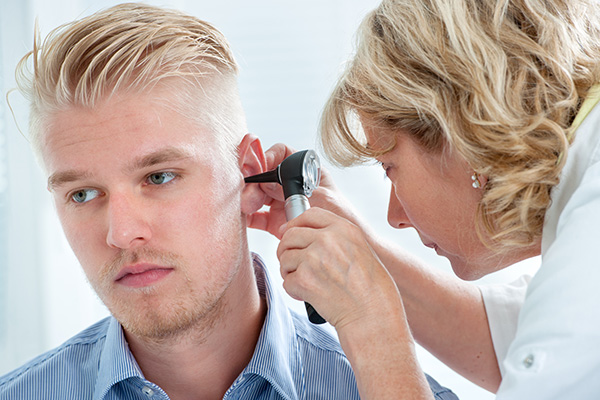Stories you may like
Audiometric Technician
An audiometric technician is a part of the hearing health professionals group. An audiometric technician in the simplest form is a person who is certified to test an individual’s hearing at or by a workplace; essentially a workplace hearing test.
An audiometric technician must take an audiometric training course and government standard written and practical exam in order to become a certified audiometric technician. An audiometric technician may also become certified in many other industrial type testing’s that workplaces required their employees to have done prior to employment or to have check regularly throughout their employment such as spirometry, mask fit and ear mold impressions for custom ear molds.
Certified audiometric technicians are responsible for the testing of employees at different workplace sites. An audiometric technician will travel from workplace to workplace, in a cube vehicle housing a sound booth and testing equipment, to perform the required testing requested from each workplace.
Prior to testing at a worksite, the audiometric technician must ensure they are in a safe and quiet location on the worksite, so he desired testing can be performed with little to no distractions. A sound level meter is used to ensure the testing environment is suitable for testing and the reading is recorded; this machine measures the noise level in decibels.
When it is determined the environmental noise is suitable for testing, the audiometric technician will set up the workspace. This may include testing the sound booth to ensure it is sealed properly so no ambient noise can enter thus altering the test results, checking the audiometer to ensure it is functioning properly and making sure all cords to and from the machine and the sound booth are relaying the proper information back and forth. Finally, they will check their otoscope to ensure it is functioning properly.
Once the safety checks are complete the audiometric technician will call in individuals one at a time for privacy and to decrease any extra noise during the testing. Each individual will complete a form as required by the testing company, workplace and government regulations. Once the form is complete the audiometric technician will go over the form with the individual and ask any other questions that need clarification or more information on.
The audiometric technician will then enter the information into their system prior to testing to ensure consistency both currently and in the future for the individual. The audiometric technician will then check the individual’s ears for any abnormality or wax build up. If everything checks out the audiometric technician will have the individual go into the sound booth, will place the ear plugs or headphones on the person’s head and explain the testing process. The test is an air conduction pure tone test only testing at the frequencies for 500, 1000, 2000, 3000, 4000, 6000 and 8000Hz only. The results are then recorded in the audiometric technicians system and are also written on a card for the individual’s personal record. The audiometric technician will also go over the results with each individual and will make any recommendations needed at that time to the individual.
Follow-up appointments are generally done on a yearly basis and all records are check for at least 10 years.
An audiology technician, also referred to as an audiology assistant, is a professional who works in the medical field and specializes in hearing health and communication. These professionals assist audiologists as they treat patients. If you are considering a career in healthcare and want to help people with their hearing, you may be interested in working as an audiology technician.In this article, we explore the career of an audiology assistant and share steps and tips on how to become one.
What does an audiology technician do?
The responsibilities and daily tasks of an audiology technician often depend on the size of their clinic. In smaller offices, an audiology technician may be responsible for more administrative tasks than a technician working in a larger clinic.Here is a list of an audiology technician's primary duties:
- Conducting hearing tests
- Fitting patients for hearing aids
- Making adjustments to hearing aids
- Answering phone calls
- Scheduling appointments
- Preparing billing forms
- Assisting audiologists in complicated hearing tests or procedures
How to become an audiology technician
Employers often require prospective audiology technicians to meet certain experience and education requirements for the role. Here are some common steps you can take to become an audiology technician:
1. Earn a high school diploma or GED
Most employers require audiology technicians to have at least a high school diploma or GED to practice in this medical field. Though typically not required, you may benefit from taking classes in math or science, especially anatomy or biology, to prepare you for your career. This basic knowledge can help you complete some of your primary duties, including preparing invoices and bills or examining a patient's ears.
2. Pursue technical or undergraduate education
The requirements for an audiology technician can vary from state to state. In some locations, you may be able to work as an audiology technician without technical or formal education. However, enrolling in a technical program can give you an advantage over other candidates in the hiring process.If you are interested in enrolling in a technical education program, research the colleges you are considering attending to see if they have a degree for audiology technicians. Some prospective audiology technicians choose to earn a bachelor's degree in communication science or another related field. You could also earn an associate degree in the same field.
3. Gain field experience
Regardless of the education you pursue, earning field experience is important for entry-level audiology technicians. Many audiologist clinics and offices offer on-the-job training, which allows you to work under the supervision of an audiologist.
4. Take a certification exam
Some states require audiology technicians to earn a certification from the American Speech-Language-Hearing Association (ASHA) in order to properly perform their primary duties. Even if the state in which you work does not require certification, you may want to consider earning one increase your earning potential and career options.To earn an audiology technician certification, you are typically required to pass an exam. Qualifications for this exam can vary, but prerequisites often include a certain mix of education and field experience. If you have already earned a bachelor's degree, the exam's prerequisites typically include less fieldwork. If you have just earned a GED or high school diploma, you likely need more field hours to be eligible for certification.Some certification programs also offer courses to prepare you for the exam. Most certification exams test on subjects of ethics, Medicare, infections and conditions related to speech and hearing, common audiologist practices and cultural competence.
What skills do you need to be an audiology technician?
Knowledge of hearing and speech health, basic math and anatomy helps an audiology technician perform their tasks effectively. Here is a list of other skills that may be helpful to an audiology technician:
- Organization: Being organized and detail-oriented can help audiology technicians create patient charts, file paperwork and keep their workspace tidy.
- Communication: Audiology technicians should be able to communicate their observations to their supervising audiologists and to patients. Sometimes, audiology technicians may need to explain procedures and medical conditions to patients, as well.
- Customer service: Because some audiology technicians also fill receptionist roles, they often interact with clients and health insurance representatives. These professionals also assist audiologists during patient exams. Customer service skills can help calm patients and ensure a peaceful environment.
- Analytical skills: Audiology technicians often use analytical and critical-thinking skills to help discover the best care options for a patient.
- Observation: While performing basic hearing and speech tests, audiology technicians may need to observe any abnormalities in a patient's communication habits to help an audiologist with their diagnosis.
- ASL fluency: Knowledge of languages, especially nonverbal ones such as American Sign Language (ASL), is crucial for audiology technicians. Because they often interact with people who are deaf or hard of hearing, audiology technicians who are fluent in ASL can better communicate with patients.
- Active learning: Professionals who are skilled active learners may have an advantage during their training process. Audiology technicians can learn valuable skills and knowledge from observing their supervising audiologist.
Audiology Technician Responsibilities & Duties
- Conduct hearing tests and assessments for patients of all ages
- Fit and dispense hearing aids and other assistive devices
- Conduct routine maintenance and repairs on hearing aids and equipment
- Provide patient and caregiver education on the use and care of hearing aids and devices
- Maintain patient records and update electronic databases
- Communicate with physicians and other healthcare providers to coordinate patient care
Audiology Technician Qualifications & Skills
- Bachelor's degree in audiology or related field
- Prior experience as an audiology technician
- Knowledge of current technologies and trends in audiology and hearing aids
- Associate's degree in audiology or related field
- State licensure as an audiology technician
- Ability to perform hearing tests and assessments accurately and efficiently
- Excellent communication and interpersonal skills
- Ability to work well in a fast-paced, patient-centered environment





User's Comments
No comments there.